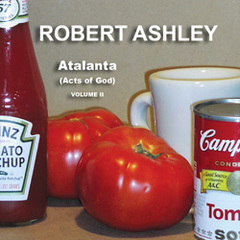Robert Ashley’s 1983 opera Atalanta is actually three operas: one about the painter Max Ernst (uncle of Bob’s wife), one about the jazz pianist Bud Powell, and one about Bob’s uncle Willard Reynolds, the family story-teller and, as Bob calls him, shaman. Any given performance is made up of one act about each hero, and the acts are interchangeable, so one performance will contain one set of stories and the next night a different set of stories. As Bob writes in his “Future of Music” lecture,Â
At the opera I am transported to a place and time
where there is no disorder. There is disorder on stage, and it is called
melodrama. We don’t believe it. This is important: that we don’t believe it. We
do believe… what happens in the movies…. Therefore, opera can have no plot. It
is foolish to argue that opera – any opera – can have a plot; that is, that the
“characters” and their apparent “actions” and the apparent “consequences” are
related in any way. Opera can be story-telling only. That the story-telling
happens on stage and that musicians are making music in the pit (to reinforce
the story told) is entirely coincidental. The story might as well be told at
the kitchen table with a crazy aunt and uncle as the soprano and tenor.
1. Homo agens: man acting, or in conflict (Allegro)
2. Homo sapiens: man thinking (Adagio)
3. Homo ludens: man playing (Scherzo), andÂ
4. Homo communis: man in the community (Allegro)
Homo agens: Improvement: Don Leaves Linda -Â Linda in conflict and acting to ensure her own safety
Homo
sapiens: eL/Aficionado,
the Agent looking back and trying to reconcile his experiences
Homo
ludens: Foreign Experiences, Don Jr. having wild rides with an Indian guide in his imagination
Homo
communis: Now Eleanor’s Idea, Now Eleanor finding her destiny within the Lowrider community
Â
It’s kind of an amazing five-and-a-half-hour operatic symphony. (I also have to wonder why I spend so much time on really, really long pieces, when I don’t write very long pieces myself.)

